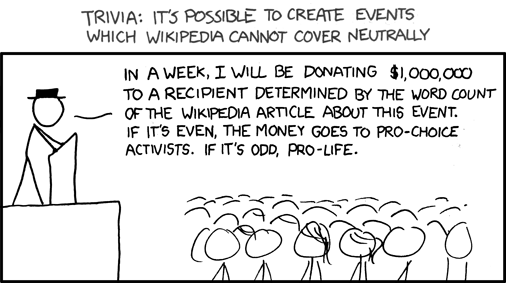On Wikipedia, Lawfare, Blogs, and Sources
A few months ago, I was asked to give a talk at the Pentagon on the concept of lawfare. I opened it with a story about how some months earlier I had tried had tried to edit the Wikipedia page on the word "lawfare" to include some of the more nuanced discussions of the subject we have had on this site. Rather to my surprise--and to the surprise of the woman with whom I was working on the project, Stephanie Leutert---our edits were taken down almost immediately, on grounds that Lawfare is a blog, not a reputable source.
Published by The Lawfare Institute
in Cooperation With

A few months ago, I was asked to give a talk at the Pentagon on the concept of lawfare. I opened it with a story about how some months earlier I had tried had tried to edit the Wikipedia page on the word "lawfare" to include some of the more nuanced discussions of the subject we have had on this site. Rather to my surprise--and to the surprise of the woman with whom I was working on the project, Stephanie Leutert---our edits were taken down almost immediately, on grounds that Lawfare is a blog, not a reputable source. The perverse result was that reflections on the meaning of the word "lawfare" by Jack and by General Mark Martins were removed from Wikipedia in the name of quality control. As you can imagine, this story produced some mirth at the talk, so on the Metro back to Brookings that day, I decided to write a story about it, publish that story in reputable journal, and then make the changes again---cited this time not to this mere blog but to an actual law review article.
The folks over at the Harvard National Security Journal were good enough to publish Stephanie and my article this morning. Readers may find it entertaining. It opens:

A large, powerful organization with enormous influence over public debate is stifling discussion of an important national security issue. It has censored emerging ideas by prominent intellectuals and practitioners in the field. It makes irrational, outdated choices about what sources constitute acceptable reading for the public’s delicate eyes. Its conservatism about reputation and sources stifles the contribution of new media to the discussion—and thus has the effect of perpetuating stale ideas. We’re not talking about the CIA, the NSA, the military, or the media. We’re talking, of course, about Wikipedia. In June 2012, we tried to edit the crowd-sourced encyclopedia’s entry on the word “lawfare”—a portmanteau of the words “law” and “warfare” which has come to refer, broadly speaking, to the use of law as a weapon of war. One of us (Wittes) is a co-founder and the editor in chief of the Lawfare Blog, a multimedia website devoted to the intersection of national security and law. The other (Leutert) is a research associate at a prominent foreign policy-oriented think tank in New York, who was helping Wittes, on a freelance basis, to develop a separate personal web site and add material to his Wikipedia entry. The goal in editing the “lawfare” entry on Wikipedia was not to advertise the Lawfare Blog—though that certainly would have been a happy collateral outcome. The goal, rather, was to expand the debate on national security and, in particular, the conversation surrounding the term “lawfare,” by incorporating into Wikipedia’s dry and narrow definition of the word some of the rich discussion of the term’s meaning that has taken place on the Lawfare site, where a number of prominent scholars and practitioners have reflected on the word’s meaning. Rather to our surprise, our edits were almost immediately undone; the material we added was, literally within minutes, removed. The reason? The disreputable nature of blogs. Wikipedia is, as we shall explain, somewhat inconsistent on this point, but as to the word “lawfare,” it enforced its no-personal-blog rule with a brutal kind of rigor. The consequences are bizarre: As a result of this rule, Wikipedia denies its readers access to the thoughts of an active-duty brigadier general who currently serves as chief prosecutor of the U.S. military commissions, as well as those of a Harvard Law School professor who happens to be among the world’s most renowned national security law scholars. The incident, which we presume is not unique, suggests that Wikipedia’s policies may require reconsideration.Stephanie this morning reentered our changes to the Wikipedia page. As of this writing, they are still there. UPDATE: This excellent comic from XKCD seems somehow relevant (h/t Ken Anderson)

Benjamin Wittes is editor in chief of Lawfare and a Senior Fellow in Governance Studies at the Brookings Institution. He is the author of several books.




